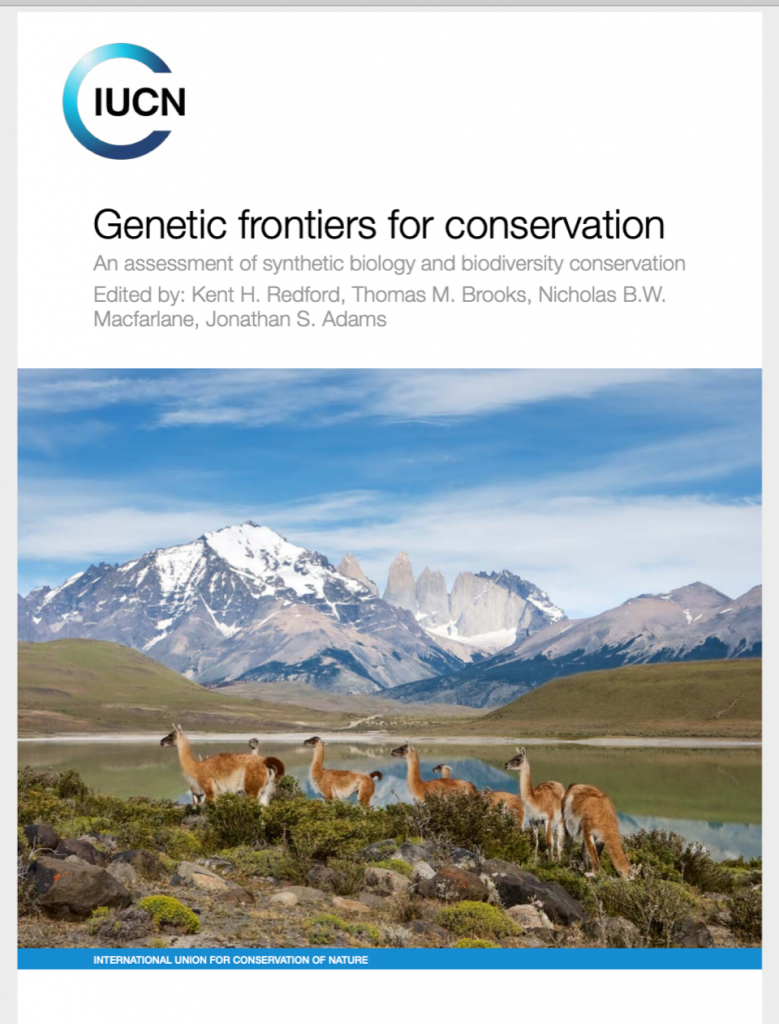

With Archipelago Consulting I have pursued a set of projects proposed by clients as well as pursuing a set of research interests of my own. Clients have included the Global Environment Facility, U.S. National Park Service, Markets Institute of the World Wildlife Fund-U.S., Health Program of Wildlife Conservation Society and Gordon and Betty Moore Foundation. Research projects have looked at privately protected areas, management of free-ranging domestic cats, the effects of captivity on the microbiome of white-footed mice and developing a conservation plan for the wild relatives of domesticated animals.
2025-2026
- Conceived, and fund-raised for a 30-person workshop on “Conservation in a microbial world”. Co-organized with Jack Gilbert of University of California, San Diego the objective was to build the capacity and interest of the global conservation community in the microbial world through the International Union for Conservation of Nature (IUCN) Species Survival Commission (SSC). The meeting resulted in the formation of IUCN’s first group devoted to conservation of microbes and was covered in Science and other outlets. Work of the SSC group is on-going.
- Participated in the meeting “Spirit of Asilomar and the Future of Biotechnology.”
- Consultation for the Paint Rock Forest Research Center, Alabama (pro-bono)
- Appointed to the Programme Committee for the World Parks Congress to be held in Panama in September 2027.
- Raised support for, and organized a workshop on “Future Conservation Values” to be held in Peru in September 2026.
2022-2024
- For WWF-US effort to establish a Codex Planetarius write the section on ways to measure impacts of commodity production on biodiversity
- Helped raise funds for and helped lead establishment of World Commission on Protected Areas Task Force on One Health and a working group to harmonize different categories of protected areas.
- Participant in two working groups: “Ethics of deliberate extinction” (led by Jim Collins and Greg Kaebnick); and “New genes and new species” (led by Michael K. Schwartz and Jedediah Brodie).
- US National Park Service: With Elaine Leslie, prepare an analysis of free-ranging horses on barrier island parks of the US eastern seaboard.
- Gordon and Betty Moore Foundation: Develop and lead an expert workshop on One Health to aid the Foundation in determining potential future action on this topic
- Publish with Aram Calhoun and Mac Hunter the edited volume: “Our Maine. Exploring its Rich Natural Heritage” (Down East Books, 2023).
- IUCN: with Brent Mitchell develop and lead a workshop with IUCN on Engaging Industry in Conserving Nature, Case Studies of biodiversity actions on companies’ operational lands and seas; published by IUCN in late 2023.
2017-2021

- IUCN: Assemble and lead a process to examine the relationship between synthetic biology and biodiversity conservation; including leading on an evidence-based assessment and policy development for the 2020 World Conservation Congress (2018 – on-going). Pictured at right.
- Published a book with W.A. Adams on the challenges synthetic biology poses for the conservation of nature (Strange Natures. Conservation in the era of Synthetic Biology. Yale University Press)
- Gordon and Betty Moore Foundation Environment Program: helping to develop a new investment model for global conservation efforts
- US National Park Service: co-organize and facilitate a meeting on invasive animal management in Pacific national parks
- US National Park Service NPS – Forming and leading an invited “Invasive Animals Independent Science Panel” to evaluate the extent of the problem of invasive alien animal species, assess management needs, review best practices and assess potential organizational models that could serve as a service-wide organizational framework for the National Park Service
- Market Institute, World Wildlife Fund-US: a series of analyses and writing projects concerning commodity production and the relationship to environmental conservation
- The Scientific Technical Advisory Panel of the Global Environment Facility commissioned a review to help develop guidance for the GEF on how best to address the issue of “novel entities” to ensure that these possible pressures and drivers of environmental degradation (and potential solutions) are well understood and any future interventions are supported by the latest science. For the purposes of this review “novel entities” are defined as: 1) persistent organic pollutants; 2) nanotechnology; and 3) synthetic biology (2017)
2016
- World Wildlife Fund-US: work on illegality in agriculture and commodity chains and on 18 major emerging trends in global agriculture
- Packard Foundation: Evaluation and strategic planning for “Linking Knowledge with Action” program
- Colorado State University: scoping work for creation of a Center for Environmental Evidence
- Lincoln Park Zoo (Chicago): team member for review of Conservation and Science Program
- US Department of Agriculture: seminar to Latin American agricultural professionals on synthetic biology and conservation
2015
- JRS Biodiversity Foundation: Strategic planning
- Moore Foundation: Writing a strategy-background paper for the Foundation’s Amazon-Andes Initiative
- MacArthur Foundation: Part of a team led by Michael Wells to evaluate the Foundation’s Conservation and Sustainable Development program.
- Self-initiated: With Ryan Phelan and Stewart Brand of “Revive and Restore” organize and run a workshop on application of new genomic tools to wildlife conservation.
- GEF Independent Evaluation Office: Technical Advisory Committee on Global Protected Area Evaluation
- Association of Zoos and Aquariums: Technical advisor on development of a new program “Saving Animals from Extinction.”
- CIFOR: Part of a team completing a systematic review of “alternative livelihoods” in conservation.
2014
- Gordon and Betty Moore Foundation: Science lead on a team led by Michael Wells to review the Foundation’s $400 million investment in Conservation International.
- Scientific and Technical Advisory Panel, Global Environment Facility: Write a framing paper evaluating GEF’s global experience with “mainstreaming,” help organize a meeting of mainstreaming practitioners in South Africa, speak as part of a panel on mainstreaming at the World Parks Congress.
- Self initiated, funded by Linden Trust for Conservation: With Sue Stolton and Nigel Dudley run a two year process to review the state of private protected areas globally, write an IUCN technical paper and organize and run three sessions on private protected areas at the World Parks Congress.
- US National Park Service: Consult and run a participative workshop to develop strategy for the NPS Threatened and Endangered Species program.
- US National Park Service: Help develop and run a workshop on biodiversity discovery in national parks.
- Conservation Measures Partnership and Conservation Coaches Network: Organize and run an evaluation of a decade of work by the two organizations on teaching and implementing adaptive management programs in conservation.
- National Fish and Wildlife Foundation: Member of a three person “Blue-ribbon Panel” to advise on its conservation strategy.
- World Association of Zoos and Aquariums 2013 Annual Conference: Plenary Speech
- American Zoo and Aquarium Association Director’s Policy Conference: Plenary Speech
- Indianapolis Zoo: Two speeches.
- DuPont: Insight Series on synthetic biology
2013
- Society for Conservation Biology: Benchmarking study on the role of journal publishing in scientific societies
- Wildlife Conservation Society: Convening the Synthetic Biology and the Conservation Communities in a meeting in Cambridge, UK. The purpose of the meeting was to bring together experts from both fields to exchange views, concerns, and hopes. See “Resources” for publications and material.
- University of California, Davis and California Air Resources Board: Expert Panel Member on a project to establish a monitoring system to identify and evaluate potential adverse impacts caused by the Compliance Offset Protocol for U.S. Forest Projects (U.S. Forest Protocol).
- A major conservation NGO: Write a review on options for expanding its global portfolio for wilderness protection.
- Invited speaker at “The Seminar” – meeting of US’ major public affairs professionals.
- GEF: help structure a new crosscutting portfolio.
- Wildlife Conservation Society: Help organize and facilitate the 4th meeting of the American Bison Society.
- National Fish and Wildlife Foundation: consult on developing a new conservation strategy.
- Invited speaker to SB6.0 – the global meeting of the synthetic biology community.
2012
- Wildlife Conservation Society: External review of WCS-Malaysia Program.
- Center for International Forestry Research (CIFOR): Lead in producing a paper “Great Apes and Poverty Alleviation” as part of a “Best Practices” series published by IUCN and the Great Ape Specialist Group.
- Woodland Park Zoo, Seattle: Advisor on an Association of Zoos and Aquariums (AZA) “Field Conservation Assessment Taskforce” to help increase zoo support for field conservation.
PRO-BONO
- Assigning Editor, Conservation Science and Practice
- English Language Editor: “Atlas of the mammals of Iran” (published 2017)
- PhD Committee of Allison Catalano, Imperial College, London.
- Member of WWF-US’s “Thought leaders group” of the Markets Initiative, 2016-ongoing
- Imperial College, London, 2014-5: Tansley Working Group: Connecting Evaluation and Conservation through Systems Thinking.
- Colorado State University, 2014: Advancing values research in environmental conservation.
- WWF-US: Kathryn Fuller Science for Nature Lecture, 2014.
- International Conference on “Hybridization between wild and domestic animals as a conservation threat and opportunity” (Grosseto, Italy), 2014. Presented a paper.
- Woodrow Wilson – Joint Bioenergy Institute, 2014: synthetic biology meeting.
- National Park Service, 2014: Climate Change Webinar.
- U.S. National Academy of Sciences 2011. Plenary presentation to a visiting delegation of Iranian wildlife and conservation scientists.
- IUCN: Joint Taskforce, Species Survival Commission and World Commission on Protected Areas (2010- 2016)
- The Nature Conservancy – Maine Chapter, 2013-2017. Trustee.
- The Nature Conservancy – New York Chapter, 2029-2011. Trustee.
- Editorial Boards: “Conservation Biology” (completed 18 year term), “Oryx”, and “Parks.”
